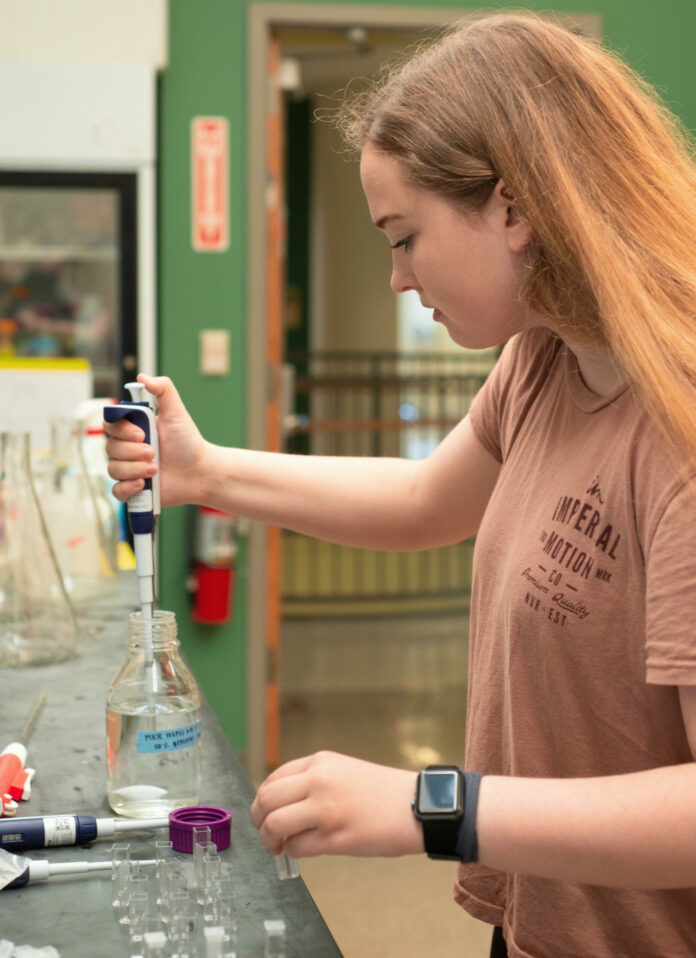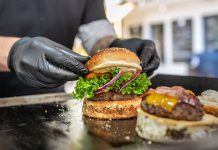In 2002, I was sitting at a table in the toddler room of the Children’s Center of San Lorenzo Valley at Highlands Park with a sweet and inquisitive toddler named Miranda Robinson. She had two plastic cups in front of her. While my own 2-year old was outside eating sand and pretending that plastic dinosaurs could talk, Miranda turned to me and said, “That cup is blue.” I nodded in agreement. “That cup is green,” she said. Again, I nodded. Then she said, “Those cups are similar.” And I knew from that very moment that Miranda wasn’t just another toddler. Even in her tiny OshKosh B’Gosh overalls, with blond curly hair kissing her miniature shoulders, she was bound for greatness.
And so it was no surprise to learn that, as a junior, Miranda was awarded the Alphonse C. Lova Memorial Award in Chemistry as a rising senior chemistry or biochemistry major who is planning a career in medical research. The toddler who knew that two things could be different yet similar is now elbow-deep in her education at Muhlenberg College in Allentown, Pennsylvania, and is slated to graduate in 2021. Her wisdom and curiosity will serve us all well—read on to learn how this young lady’s gonna change the world.
Press Banner: Tell me a little about why you chose Muhlenberg College. With only 2,200 students, and tucked away near Allentown, Pennsylvania, there must have been some wonderful attraction to the school.
Miranda Robinson: I get this question a lot! I was really involved in theater through elementary, middle, and high school, and while I decided during my senior year that I didn’t want to necessarily pursue a degree in theater alone, I wasn’t ready to give it up entirely either. Academically, I always really enjoyed math and science, so what drew me to Muhlenberg originally was that I read about a lot of students who had double majors in theatre or dance and biology or chemistry. Once I was accepted to the school, I actually received a message as part of an honors program from an upperclassmen who was a double major in Neuroscience and Theater (and was actually from Marin County, just north of San Francisco), which I remember really made me feel like I would fit in there. The opportunity for cross-over between the arts and sciences was unmatched by any of the other schools that I was looking at, and I think that was ultimately what made me choose it. Particularly in my freshman year, I really took advantage of this. At the time, I was planning on majoring in Biology (I was interested in, but not yet settled on, the possibility of medical school at the time) and Theater, so I took a wide range of classes that year ranging from general chemistry and intro biology to dance and theater classes. I also joined a dance group (which I am still a part of). Since then, my focus has shifted much more towards the sciences, and now I am majoring in just Biochemistry and planning on attending medical school. However, I still take dance classes for fun, and last year I participated in a program where we toured local elementary schools, danced for and taught the kids about rhythm.
PB: You’re graduating in 2021, but you’ve had to spend the last few months of your junior year in distance learning. What is that like for you, and how is it impacting your ability to remain engaged in collegiate life?
MR: Moving online was definitely a challenge, but thankfully my professors were very understanding and supportive in the adjustment, and my school did a lot to help them transition effectively to online teaching. As I think many people are finding in all of this, working from home poses its own challenges and distractions. While I only had one class this semester with a lab component (and one that was easy to move online), so this didn’t necessarily affect me significantly, I know that figuring out how to give a lab-experience for science classes was one of the biggest challenges with moving online. Some arts classes, particularly those in dance and acting, also struggled to move online. Nonetheless, I found that personally, for the most part, I was able to get many of the same academic experiences that I would have at school, albeit in a less engaging environment. Other campus activities took a much bigger hit. Most of the things I was involved with, such as the dance group and the collegiate EMS service I typically participate in stopped completely with our leaving campus. The research lab that I work in was also closed, meaning that all of our work was also suspended when we left. This was true for most labs on campus (except those which were able to continue working remotely), and was one of the hardest things about leaving campus for me and many others. I particularly feel bad for seniors, especially those working on honors thesis projects, who likely will never get the chance to finish that work. It was also odd to adjust to the extra time that the cancellation of these activities provided. For example, in a typical week I would probably spend ~10-12 hours working on research in the lab and have one or two duty shifts for EMS (which are either 12 or 24 hour shifts; time on calls varies), as well as a number of meetings for various campus organizations and executive boards which were mostly cancelled once we left. Thankfully, I have been able to continue my work as a Learning Assistant for General Chemistry, as the school has moved all tutoring resources online throughout all of this. So, while it is certainly not ideal, I think that everyone did the best they could in adjusting to difficult circumstances. Of course, it was also very difficult to leave all of my friends suddenly, but we have been doing our best to keep up over Zoom and Facetime when possible. Overall, I think that our student body was very understanding of the necessity of these measures, despite some of the disappointments. I am very thankful that I have another year which I will hopefully get to finish on campus, at least in part.
PB: I see that the memorial award bestowed upon you is usually “awarded to a rising senior chemistry or biochemistry major who is planning a career in medical research.” Being a junior, how were you selected for this honor?
MR: I am not entirely sure what the selection process for the awards presented at our annual Honors Convocation entails, but you can read about the awards here: https://www.muhlenberg.edu/news/2020/2020honorsconvocation.html. In terms of my eligibility for the award: In my sophomore year, I started doing research in a biochemistry lab with Dr. Keri Colabroy at Muhlenberg. We study an enzyme involved in the Lincomycin (an antibiotic) biosynthesis pathway, in hopes of elucidating valuable mechanistic (the chemical steps of the enzymatic reaction) and kinetic insight with possible applications for novel syntheses. The synthesis of this relatively complex compound occurs naturally via multiple enzymatic steps in a bacterium called Streptomyces lincolnensis. In addition to my work during the academic year, I worked in our lab last summer, finishing up work on a project which we published in ACS Biochemistry last fall (https://pubs.acs.org/doi/abs/10.1021/acs.biochem.9b00456). Prior to these experiences, my interests were more clinical and while I expected to enjoy research, I really fell in love with it, and started wondering how it might fit into a career in medicine. I am now considering an MD/PhD, though I am not entirely sure how I want to incorporate it yet and may take a path more focused on the MD degree while doing research along the way. I was looking forward to exploring these options further through a program I was supposed to participate in this summer at Children’s Hospital of Philadelphia (CHOP) called CRISSP. I was going to be working under Dr. Marni Falk and her colleague Dr. Eiko Nakamaru-Ogiso on a project surrounding mitochondrial medicine. Dr. Falk is a physician at CHOP and Dr. Ogiso is a biochemist, and both are affiliated with CHOP as well as the University of Pennsylvania Perelman School of Medicine. Unfortunately, that program was cancelled, but I will hopefully be able to participate in it next summer! Instead, I will be working remotely this summer on a project with my research advisor at Muhlenberg.
PB: Tell me about some of the opportunities and challenges that exist with attending an out-of-state college.
MR: I really wanted to go to school out-of-state when I was in high school, and I think that it is has been both good and bad. It has certainly provided me with a different perspective, and given me the chance to experience something different with relatively little long-term commitment, but I also think that I underestimated how tiring the travel of going to school far away would be. Many of my friends live close enough to go home for a weekend, which I sometimes envy. However, especially as a freshman, I really liked feeling like I had the opportunity to start somewhere new and experience something different. Looking at schools out of state also provided me with a lot more options, which I think can be helpful in finding the right fit (to connect to your next question).
PB: Do you have any advice for future college attendees when it comes to finding their best fit?
MR: I honestly think that finding the right fit for college can be difficult, so it’s important to really consider all of your options. I’m not sure I have much advice to offer beyond the more typical suggestions available everywhere, but I will stress that I think meeting the students is definitely important. Especially if you are looking at schools far away, it can be hard to visit campus during the academic year, but you should make an effort, if at all possible. I actually visited Muhlenberg during the summer when I was in high school, and while I liked the campus at the time, it was ultimately the people I met at a scholarship audition here in California that really sold me on the school.
PB: What is the best life lesson you’ve learned at Muhlenberg?
MR: This is a good (and hard) question. There are a few different things I could say, but I think perhaps the most prominent is that it has helped me embrace change.
As I mentioned above, I was really involved with theater and the arts when I was in high school and when I took such an interest in my science classes as a freshman at Muhlenberg part of me felt like there was something wrong with devoting more of my time to that instead of my music and dance classes that I had focused on so much when I was younger. But my professors (from all departments) were really supportive and encouraging in saying that college is all about figuring out what you are interested in, and that its okay if those interests change (or if you develop new ones), and I am really thankful for the path that following those interests has put me on!












